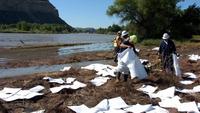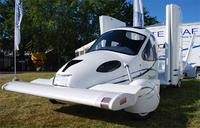-
New technology increase potency of beam weapons

Laser scientists and engineers have long recognized that direct-diode lasers can offer significant advantages over other laser technologies due to their efficiency, reliability, compactness, and relatively low cost; applications for direct-diode lasers have been limited, however, owing to their low brightness — a combination of lower power and poorer beam quality relative to alternative laser technologies; a Massachusetts-based company, using wavelength beam combining (WBC) technology, is offering a way to solve this problem — allowing direct-diode lasers to be used in demanding industrial applications — and in effective beam weapons
-
-
Fire retardant shows promise -- if given space
Scientists have demonstrated that the more widely and uniformly dispersed nanoscale plates of clay are in a polymer, the more fire protection the nanocomposite material provides; when polymer — a type of polystyrene, used in packaging, insulation, plastic cutlery, and many other products — is imbued with nanometer scale plates of montmorillonite, the combination can create a material with unique properties or properties superior to those achievable by each component — clay or polymer — on its own
-
-
Montana floods exacerbate Exxon oil spill

Flooding in Montana has exacerbated the effects of an oil spill and made clean up more difficult for Exxon Mobil; it is estimated that roughly 750 top 1,000 barrels of crude oil have leaked into the Yellowstone River near Billings, Montana; the pipeline has been shut down, but flooding in the area has made it difficult for clean-up crews to find the source of the leak
-
-
A first: Flying car cleared for road

The U.S. Department of Transportation gave Massachusetts-based Terrafugia two important exemptions which would allow the company to offer its flying car — the Transition — to customers next year; the exemptions allow the company to use different tires and different laminated protective glass, and come on top of a 110 lb. allowance the FAA gave the company last year; these allowance and exemptions mean the flying car will not be treated as plane by the FAA, and those who fly it will not have to obtain a pilot license
-
-
Roving robot can rescue people, detonate bombs
Northeastern University student-researchers have created a roving robot that can locate and rescue victims of natural disasters or participate in military missions that are too dangerous for soldiers; students created a complex algorithm that would enable the robot to locate people — or even bombs that are detonated through mobile phones
-
-
Japanese discovery could undermine China's rare earth dominance
A new discovery by Japanese researchers could break China’s stranglehold over rare Earth metals; Japanese geologists say they have found large deposits of rare Earth minerals on the floor of the Pacific Ocean; it is estimated that the mud of the Pacific Ocean contains 100 billion tons of these minerals
-
-
Microalgae : Texas' next big cash crop
There are an estimated 200,000 to 800,000 species of microalgae — microscopic algae that thrive in freshwater and marine systems; scientists say microalgae offers a huge, untapped source of fuel, food, feed, pharmaceuticals, and even pollution-busters; it is set to be Texas’ next big cash crop
-
-
New technology makes textiles permanently germ-free

University of Georgia scientist develops a new technology that makes textiles permanently germ-free, targeting healthcare-associated infections; the new material effectively kills a wide spectrum of bacteria, yeasts, and molds that can cause disease, break down fabrics, create stains, and produce odors
-
-
Quake-resistant superelastic alloy developed
Japanese scientists added a small amount of nickel to an iron-based alloy, and found that the new material can recover its original shape at any temperature from -196 to 240 degrees Celsius; the material may be used in environments that are constantly exposed to extreme temperatures, such as joints and controls in cars, planes, and spacecraft; it may also help buildings cushion stress and violent movement in earthquakes
-
-
Flights increase rain and snow near airports
Areas near commercial airports experience a measurable increase in rain and snow when aircraft take off and land under certain atmospheric conditions; when planes fly through certain mid-level clouds, they force nearby air rapidly to expand and cool; this causes water droplets to freeze to ice and then turn to snow as they fall toward the ground, often leaving behind odd-shaped gaps in the clouds
-
-
"Sensing skin" to monitor concrete infrastructure health inexpensively
In 2009, the American Society of Civil Engineers (ASCE) assigned the grade D to the overall quality of infrastructure in the United States and said that ongoing evaluation and maintenance of structures was one of five key areas necessary for improving that grade; civil engineers recently proposed a new method for the electronic, continual monitoring of structures
-
-
Farm animal disease to increase with climate change
Researchers looked at changes in the behavior of bluetongue — a viral disease of cattle and sheep — from the 1960s to the present day, as well as what could happen to the transmission of the virus forty years into the future; they found, for the first time, that an outbreak of a disease could be explained by changes to the climate
-
-
Bomb-proof bag for planes' luggage compartment developed

The blast-absorbing bag, named the Fly-Bag, features multiple layers of novel fabrics, composites, and coatings and is designed to be filled with passenger luggage and then placed in the hold of a plane; if one of the pieces of luggage inside the Fly-Bag had a bomb in it and the bomb exploded during the flight, the resulting blast would be absorbed by the bag owing to its complex fabric structure, preventing damage to the plane; fundamental to the design of the bag is the internal elastomeric coating and impregnation of fabric with Shear Thickening Fluids (STF); STFs work by increasing in viscosity in response to impact
-
-
Disappearing La Niña blamed for U.S. disastrous weather since January
La Niña and El Niño are opposite extremes of a great Pacific oscillation; every two to seven years, surface waters across the equatorial Pacific warm up (El Niño) and then they cool down again (La Niña); each condition has its own distinct effects on weather; La Niña was strong in December, but disappeared in January, leaving nothing to constrain the jet stream; the jet stream took advantage of the new freedom — with disastrous results for the weather
-
-
New building material could help solve bridge woes
With infrastructure in the United States rapidly aging and in need of repair, new building materials made in Maine that make bridges cheaper, lighter, and more durable could help cash starved states undertake critical infrastructure investment; using lightweight hybrid composite beams, the Maine Department of Transportation (MDOT) has just completed the largest composite bridge in the world; the new bridge is projected to last at least 100 years; the material’s weight, cost, and durability have generated a lot of interest across the country
-
More headlines
The long view
New Technology is Keeping the Skies Safe
DHS S&T Baggage, Cargo, and People Screening (BCP) Program develops state-of-the-art screening solutions to help secure airspace, communities, and borders
Factories First: Winning the Drone War Before It Starts
Wars are won by factories before they are won on the battlefield,Martin C. Feldmann writes, noting that the United States lacks the manufacturing depth for the coming drone age. Rectifying this situation “will take far more than procurement tweaks,” Feldmann writes. “It demands a national-level, wartime-scale industrial mobilization.”
How Artificial General Intelligence Could Affect the Rise and Fall of Nations
Visions for potential AGI futures: A new report from RAND aims to stimulate thinking among policymakers about possible impacts of the development of artificial general intelligence (AGI) on geopolitics and the world order.
Smaller Nuclear Reactors Spark Renewed Interest in a Once-Shunned Energy Source
In the past two years, half the states have taken action to promote nuclear power, from creating nuclear task forces to integrating nuclear into long-term energy plans.
Keeping the Lights on with Nuclear Waste: Radiochemistry Transforms Nuclear Waste into Strategic Materials
How UNLV radiochemistry is pioneering the future of energy in the Southwest by salvaging strategic materials from nuclear dumps –and making it safe.
Model Predicts Long-Term Effects of Nuclear Waste on Underground Disposal Systems
The simulations matched results from an underground lab experiment in Switzerland, suggesting modeling could be used to validate the safety of nuclear disposal sites.
